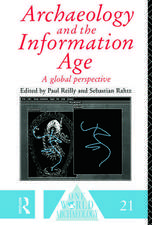Cracking the Digital Ceiling
Editat de Carol Frieze, Jeria L. Quesenberryen Limba Engleză Paperback – 23 oct 2019
| Toate formatele și edițiile | Preț | Express |
|---|---|---|
| Paperback (1) | 211.21 lei 6-8 săpt. | |
| Cambridge University Press – 23 oct 2019 | 211.21 lei 6-8 săpt. | |
| Hardback (1) | 536.32 lei 3-5 săpt. | |
| Cambridge University Press – 23 oct 2019 | 536.32 lei 3-5 săpt. |
Preț: 211.21 lei
Preț vechi: 264.01 lei
-20% Nou
Puncte Express: 317
Preț estimativ în valută:
40.42€ • 42.04$ • 33.37£
40.42€ • 42.04$ • 33.37£
Carte tipărită la comandă
Livrare economică 14-28 aprilie
Preluare comenzi: 021 569.72.76
Specificații
ISBN-13: 9781108740074
ISBN-10: 1108740073
Pagini: 356
Dimensiuni: 152 x 227 x 20 mm
Greutate: 0.64 kg
Editura: Cambridge University Press
Colecția Cambridge University Press
Locul publicării:New York, United States
ISBN-10: 1108740073
Pagini: 356
Dimensiuni: 152 x 227 x 20 mm
Greutate: 0.64 kg
Editura: Cambridge University Press
Colecția Cambridge University Press
Locul publicării:New York, United States
Cuprins
Introduction Carol Frieze and Jeria L. Quesenberry; Part I. Global Perspectives: 1. An inegalitarian paradox Tiffany Chow and Maria Charles; 2. Perspectives from the UNESCO Science Report 2015 Toward 2030 Sophia Huyer; 3. Field studies of women in Europe, North America, Africa and the Asia-Pacific Eileen M. Trauth; Part II. Regional Perspectives: 4. Socio-cultural complexities of Latin American and Caribbean women in computing Palma Buttles and Fred Valdez, Jr; 5. A gender perspective on computer science education in Israel Orit Hazzan, Efrat Nativ-Ronen and Tatiana Umansky; 6. Factors influencing women's ability to enter the IT workforce Sophia Huyer and Nancy J. Hafkin; Part III. Cultural Perspectives from the United States of America and Europe: 7. Against all odds Monica Adya; 8. Cultures and context in tech Sally Applin; 9. Perspectives of women with disabilities in computing Brianna Blaser, Cynthia Bennett, Richard Ladner, Sheryl Burgstahler and Jennifer Mankoff; 10. An interview with Dr Sue Black, OBE, computer scientist and computing evangelist Sue Black; 11. An overview of the Swedish educational system with a focus on women in computer science Sinna Lindquist and Ingrid Melinder; 12. Portugal: perspective on women in computing Arminda Guerra Lopes; 13. Women in computing: the situation in Russia Evgeniy K. Khenner; Part IV. Cultural Perspectives from Asia-Pacific: 14. More Chinese women needed to hold up half the computing sky Ming Zhang and Yichun Yin; 15. How the perception of young Malaysians towards science and mathematics influences their decision to study computer science Mazliza Othman and Rodziah Latih; 16. Of pedestals and professions: female software engineers in Tamil cinema Joyojeet Pal; 17. Women in computing education: a western or a global problem? Lessons from India Roli Varma; 18. Challenging attitudes and disrupting stereotypes of gender and computing in Australia Catherine Lang; Conclusion.
Recenzii
'Rich with data and examples, thought provoking, affirming, and sometimes deeply troubling, Cracking the Digital Ceiling offers a diverse collection of voices and perspectives on women in computing. It is absolutely a must-read book for anyone seeking to understand and improve gender equity in this important field.' Alison Derbenwick Miller, Vice President, Research and Emerging Technology, Oracle
'At the University of Malaysia, half the undergraduate students in CS/IT are female. The same is true in CS at Carnegie Mellon (CMU), one of the most competitive programs on the planet. Why do these universities defy stereotypes or perceived norms? As this important and ground-breaking volume in the gender in STEM literature clearly and convincingly demonstrates with research from around the world, culture and micro-culture are key factors at play. In Malaysia, computing is not viewed as a masculine field. Elsewhere, the good news is that one can pro-actively change the microculture, as at CMU. It's not rocket science. Common-sense programs work. Just do it!' Lenore Blum, Carnegie Mellon University, Pennsylvania
'Drs Frieze and Quesenberry expertly weave evidence from around the world to build a fascinating case for the critical role of culture change in helping increase the participation of women and girls in computing. A must read for those who want to change the status quo!' Gerry Katilius, Vision 2020 National Women's Equality Initiative Delegate and former Google Global Diversity Unbiasing Program Manager
'Beginning with eye-opening global data, this book provides insights into how cultural expectations caused women's under representation in computing. Hope is omnipresent, as evidence is presented showing how cultural change increases diversity and inclusion. Technology will be positively impacted as more girls choose computing and more women contribute to the field.' Kathleen Buse, Case Western Reserve University, Ohio
'Incredible variety and breadth of countries, with many insights on the issues surrounding women in computing. This is a great book for those starting out their readings in gender issues in computing, but also for those that need more information about the women in computing issues around the world.' Daniel Mosse, University of Pittsburgh
'Computing is not just for men! Frieze and Quesenberry have teamed up again to teach us the complexities that exist in women's low participation in computing around the world. Read this book, use what you learn to adapt locally, and let's change the face of computing!' Tracy Camp, Colorado School of Mines
'… a fine addition to this extensive research on the topic, as it further strengthens the case for more women to participate in digital economies. The book is a definitive, thought-provoking, and extremely well-organized collection of global perspectives carefully curated by experts Carol Frieze and Jeria Quesenberry.' Tetyana Darian, Technical Communication
'At the University of Malaysia, half the undergraduate students in CS/IT are female. The same is true in CS at Carnegie Mellon (CMU), one of the most competitive programs on the planet. Why do these universities defy stereotypes or perceived norms? As this important and ground-breaking volume in the gender in STEM literature clearly and convincingly demonstrates with research from around the world, culture and micro-culture are key factors at play. In Malaysia, computing is not viewed as a masculine field. Elsewhere, the good news is that one can pro-actively change the microculture, as at CMU. It's not rocket science. Common-sense programs work. Just do it!' Lenore Blum, Carnegie Mellon University, Pennsylvania
'Drs Frieze and Quesenberry expertly weave evidence from around the world to build a fascinating case for the critical role of culture change in helping increase the participation of women and girls in computing. A must read for those who want to change the status quo!' Gerry Katilius, Vision 2020 National Women's Equality Initiative Delegate and former Google Global Diversity Unbiasing Program Manager
'Beginning with eye-opening global data, this book provides insights into how cultural expectations caused women's under representation in computing. Hope is omnipresent, as evidence is presented showing how cultural change increases diversity and inclusion. Technology will be positively impacted as more girls choose computing and more women contribute to the field.' Kathleen Buse, Case Western Reserve University, Ohio
'Incredible variety and breadth of countries, with many insights on the issues surrounding women in computing. This is a great book for those starting out their readings in gender issues in computing, but also for those that need more information about the women in computing issues around the world.' Daniel Mosse, University of Pittsburgh
'Computing is not just for men! Frieze and Quesenberry have teamed up again to teach us the complexities that exist in women's low participation in computing around the world. Read this book, use what you learn to adapt locally, and let's change the face of computing!' Tracy Camp, Colorado School of Mines
'… a fine addition to this extensive research on the topic, as it further strengthens the case for more women to participate in digital economies. The book is a definitive, thought-provoking, and extremely well-organized collection of global perspectives carefully curated by experts Carol Frieze and Jeria Quesenberry.' Tetyana Darian, Technical Communication
Descriere
A global examination of what influences women's participation in computing and what can be done to fix the gender gap.

























